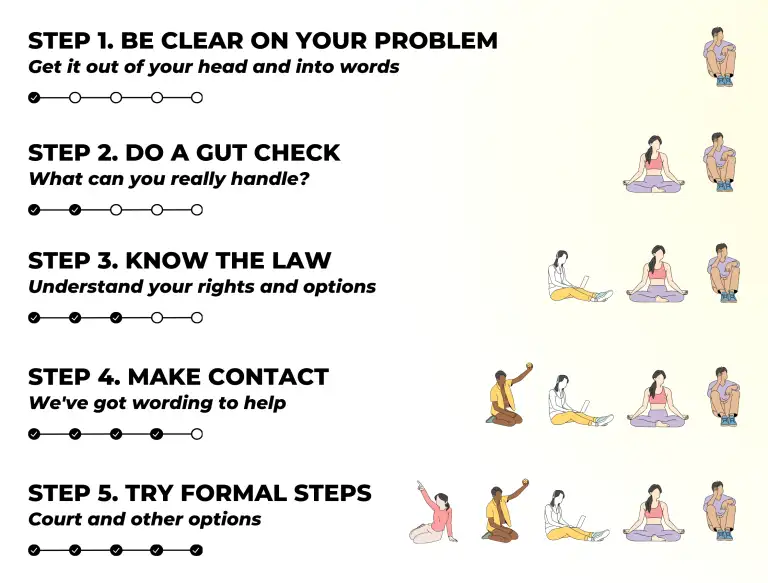
Every legal problem is unique. So when you face one in your own life, there are plenty of factors to consider as you try to decide if and how to take it on. Things like the seriousness of the issue, and the motivations and means of the people involved, all figure in. Whether you’re hiring a legal professional to help, or going it alone, we walk you through the steps to tackle a legal problem.
Step 1. Be clear on your problem
“This was the second time I’d been passed up for a promotion. I was qualified — more so than the person who got it. And I nailed the interview. Everyone I work with was puzzled as well. I like my job, but I feel like something is off here. Someone told me I should sue. But to what end? I worry it’d make things worse. And isn’t this just how life works sometimes? I’m just lost on what to do next.”
– Fatima, Victoria, BC

Some legal problems are cut-and-dried. Probating a will? There are steps the court requires you to follow. Got a traffic ticket? The ticket explains how to dispute it. But other problems aren’t so straight-forward. First order of business is figuring out what the problem actually is.
First, how serious is it?
Be honest: Is this something that has to be solved? Or is it simply … annoying? Imagine a scale of 1-10, with 10 being your most serious possible problem. If the problem is less than, say, a 5, the effort to solve it might be more trouble than it’s worth.
Write the problem out on a page
Get it out of your head and into words. This can relieve stress and clarify your thoughts. Try to summarize the problem in a few paragraphs or bullet points, a “problem on a page” so to speak (we’ve got a helpful template for that here). Read and re-read what you’ve written. Make sure it captures:
what happened (the facts)
when it happened
who was responsible
who else is involved (as in, who can back up your story)
what you’ve lost or are trying to get back
Think about what you want
That last bullet point is worth thinking hard about. Many people assume only a money settlement will make them feel “whole.” But sometimes an apology will feel like enough. Or a pledge that the bad behaviour will stop. (Or both.) So ask yourself: what do you really want?
Do you need professional help?
Know when to get advice. The more “yes” answers to the following, the more likely you should seek help, possibly immediately.
Are the stakes high?
Do you feel unsafe?
Do you need help figuring out your options?
Options for help go beyond all or nothing
Keep in mind, asking for help doesn’t mean a lawyer or other legal professional has to do everything for you. You can ask them to handle just a part of the issue, or prepare a roadmap of steps that need to be taken. Check out our page on free and low-cost legal help for more backup.
Step 2. Do a gut check
“Mom died a few weeks ago. I was named executor in the will. Good thing I’m pretty comfortable with filling out forms and dealing with bureaucracy. I figured I could handle probate. But I’ve got two young kids and work full time. After spending a week researching and understanding the process, I decided to hire a lawyer to help. It wasn’t cheap — and I know not everyone has the luxury to get professional help in these situations — but for me and my family, it was the right choice.”
– Rob, New Westminster, BC

So you’ve diagnosed the problem. But before you dig any deeper, check in with yourself about what you can really handle. Dealing with a legal problem can be challenging. This isn’t to say you can’t do it — part of our mission at People’s Law School is to empower folks to take the next step, often on their own — but sometimes, your circumstances might make it difficult to proceed. Here are a few issues to consider.
Do you have time?
Can you commit nights and weekends doing research and filling out forms? Can you squeeze in a phone call and some emails during a work break or before you pick up your kids? If you can’t make the time, this won’t be an easy problem to solve, especially if going to court is involved.
Can you be resilient?
You may get frustrated along the way, even if you follow all the steps, rules or laws. You might have to file an appeal if things don’t go your way the first time. It can take years to solve certain legal problems.
Are you okay with confrontation and uncomfortable conversations?
To get what you deserve, you might have to be assertive. This is true whether you’re dealing with the other person in a dispute, a government office, or other agencies — or even your own professional advisors.
Do you have reliable internet access?
This may seem trivial, but without daily access to a computer and internet, it can be hard to communicate in a timely way, or do basic research.
This internal audit of your own bandwidth should be an ongoing process. The scope of a problem can quickly change. Take a gut check early and often.
Step 3. Know the law and the process
“Two thousand bucks and one week later, and still my car won’t start! The mechanic came recommended by a friend, but surely they messed something up. It’s almost a new car! Trouble is, I already paid the mechanic. Can I get my money back? Maybe they’ll agree to do the next repair for free? Or can I make them pay for the repairs at a different mechanic?”
– Hien, Sicamous, BC

You’ve scoped out the problem at a high level, and done the gut check. Now you need to arm yourself with knowledge.
Find reliable, up-to-date information
Be choosy with your internet sources. Make sure you find ones that follow accepted best practices. Look for material written by lawyers or law firms or established non-profits, and make sure it’s been published or updated recently. Make sure you’re looking at resources in your jurisdiction — things can be different between countries, and even between provinces.
Know where you stand
In step 1, you wrote out the “problem on a page.” (Here was that template we mentioned.) Now that you’ve learned a bit about the law, it’s time for another reality check. Are you actually entitled to anything? And do you have enough support (this could be witnesses, photos, and so on) to prove you’re entitled to it? Flesh out your problem further, in writing, to see what you need to do to apply the law to your situation. Think of how you’d talk it out with a friend. Get comfortable arguing in favour of your case.
Is there a roadmap you need to follow?
Some areas of the law have clear steps, while others are a bit murkier. If you’re applying to probate a will, for example, there are specific forms to fill out and timing for when they get filed. If you’re complaining about neighbour noise in your strata, find out the process for making complaints and how they get resolved. Trying to deke around an established process will result in more headaches than shortcuts.
Step 4. Make contact
“I did my research: I reviewed the law on trees, I called the municipality for backup. I even read past cases on overhanging branches. I know I'm in the right. Their trees need to be cut back. But my neighbour is a tough cookie. They’re not unreasonable, but they’ve got a strong personality and don’t back down when they’re called out. To be honest, I’m terrified about having a ‘talk’ with them. But I don’t want to get a lawyer involved (yet) or start a formal legal case.”
– Amber, Prince George, BC

You’ve got the time to deal with it, and now you know the law. The next step is where things can get hard. A Canadian study on how folks deal with serious legal problems identified contacting the other party as the least helpful in solving a problem. (Only one in four people found it helpful.)
But we’d still suggest you try. Think of it this way — if you go about it thoughtfully, there’s a better chance of it working.
Keep calm
Don’t let your anger, or your newfound awareness of your legal rights, whip you into a righteous frenzy. When you’re calm, you will exude confidence, which will help to get things resolved faster.
Plan a tiered approach
It might take more than just one strongly worded email to solve this problem. Strategize on the best way to get started — a phone call? face-to-face? in writing? — and have a plan for what you’ll do and when.
Reassess along the way
If the other side won’t budge on a certain issue, consider compromising. Are you okay with backing down a bit? Are you willing to compromise, perhaps more than you were before you got started?
Wording to help inspire you
Okay, that’s all very nice, but what should you actually say? We’ve got suggested wording to help get you started in some common situations.
Step 5. Try formal steps
“Honestly, I thought I was going to give up on my complaints about my strata when I realized I had to go to court. But then I learned that my dispute would be handled through the CIvil Resolution Tribunal, which didn’t feel like a court at all. I could navigate the whole process easily without a lawyer (everything happened online and in writing). It was so unintimidating.”
– Don, Kelowna, BC

If you're past the point of getting things resolved on your own, there are more formal steps you can take.
First, consider mediation. With the help of a neutral third party, mediation can help you and the other party talk to each other and come to a solution together. Learn more about the process here.
Failing that, you may decide to take more formal legal action. But not all legal venues are created equal, and some problems take a lot of time and effort to go through the system. Keep the following things in mind.
What court am I dealing with?
Depending on how much money is involved, or the subject matter, you might not be going through traditional court. There are various tribunals that exist that deal with, for example, employment issues or tenancy matters. And they all have different procedures. Some allow witnesses, some don’t. Some do things orally, others only let you submit arguments in writing.
Is there an appeal process?
Even if you win, many decisions can be appealed. This means more effort and patience until things are truly finalized.
Is it time to get professional help?
Maybe you’ve reached the limits of your skills and patience. Maybe you’re on the receiving end of a lawyer's letter or court summons, and never intended to deal with this problem (whether on your own, or at all). There’s no harm in considering professional help, and in BC, there are free or low-cost options for legal help available.

